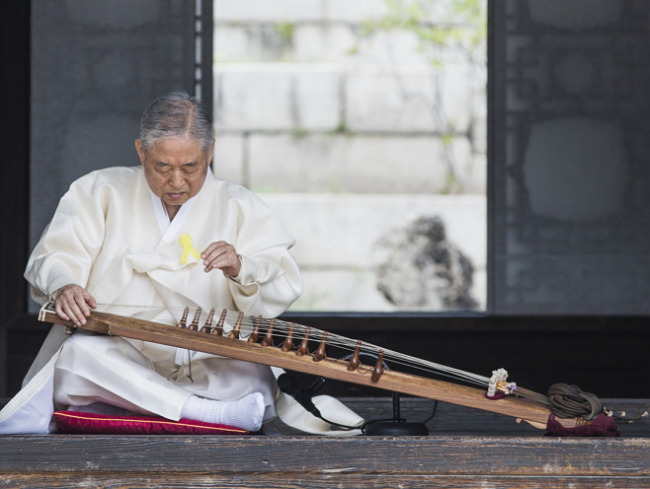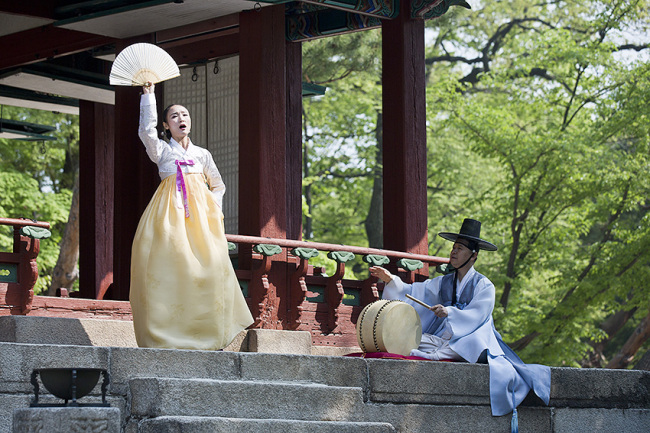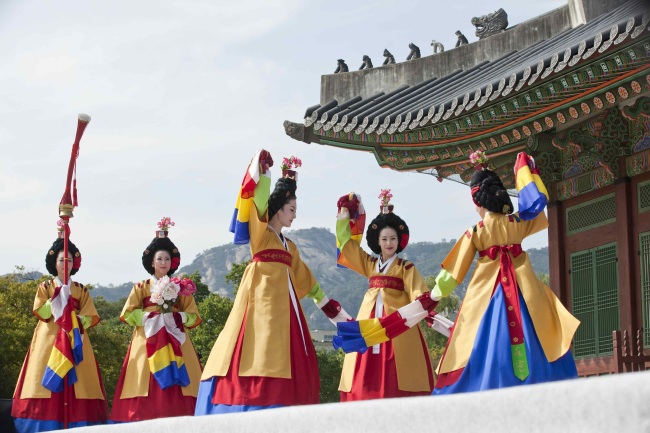Nestled in the middle of ultramodern skyscrapers, Seoul’s royal palaces are a perfect refuge from the stress of city life.
Shrouded in history, the five grand palaces of Korea’s last ruling dynasty of Joseon (1392-1910) seem almost unnaturally hushed, away from the hustle and bustle of the city.
The ambience of peace and tranquility is not all one can experience at the historic sites.
A variety of cultural programs take place there, aimed at taking visitors a step back in time to when people lived a slow and simple life, appreciating art, nature and life, in other words, enjoying “pungnyu.” ― “Pungnyu” is the Korean word for spending leisure time tastefully.
Complimentary concerts that combine classical Korean music, dance and other performances would be a rare chance for modern-day viewers to get a taste of “pungnyu.”
Two separate programs are being run by different authorities.
One is “Music at the Royal Palace,” which presents events mostly on weekends but not necessarily regularly from late May through October. The other is “Pungnyu at Deoksugung,” a program taking place at Deoksugung every Thursday evening from June until September.
“‘Music at the Royal Palace’ has returned every spring and autumn since 2008, offering an opportunity to feel the depth of Korean culture at historic places,” the Korea Traditional Performing Arts Foundation, the program’s organizer, said in a press release. This year, it runs from May 24 to Oct. 12.
Masters of Korean traditional culture appear on the program, which takes place at Gyeongbokgung, Changdeokgung and Deoksugung palaces and Jongmyo Shrine, all built in central Seoul during the Joseon era.
 |
| Gayageum master Hwang Byung-ki (Korea Traditional Performing Arts Foundation) |
Hwang Byung-ki, a player of gayageum (a 12-string Korean zither), and Ahn Sook-sun, a singer of “pansori,” a genre of traditional Korean music, are just a few names to check out.
A highlight of this program is a concert-plus-walking tour at the rear garden of Changdeokgung, a UNESCO-designated World Cultural Heritage site, on calm Sunday mornings.
It takes up to 40 participants on a 90-minute walking tour of the beautiful garden, where Joseon kings loved to stroll. When the participants reach three specific points with magnificent scenery, mini concerts of live and unplugged music start.
“It starts at 9 a.m. before the garden opens to the public. So, there’s basically no one else in the area (except participants in this program),” said Kim Sung-min of the foundation.
The concert is free of charge and accepts only 40 spectators a session. Tickets usually sell out within 10 minutes after sales begin. June concerts are fully booked, so those who want to participate will have to wait for autumn, when it returns for the Sept. 7-Oct. 12 run. 
 |
| Traditional music, dance and other forms of entertainment will play out at royal palaces in Seoul, offering visitors a chance to experience the depth of Korean culture. (Korea Traditional Performing Arts Foundation) |
A full concert takes place at Nakseonjae, a pavilion on the premise of Changdeokgung, starting at 11 a.m.
Deoksugung Palace near the City Hall runs a differentiated program that mixes the old and the new in evening concerts on Saturdays and Sundays. Fusion gugak bands, which blend contemporary music with classical Korean music or gugak, take the stage. Four fairytale-themed concerts are also scheduled for the first two weekends of June.
At Jongmyo, a Confucian shrine for Joseon kings and queens, jongmyo jeryeak, the royal ancestral ritual music designated by the UNESCO as Masterpieces of the Oral and Intangible Heritage of Humanity, will play out at 10 a.m. every Saturday until June 28, with a host explaining the music’s historical background and characteristics. For more information about Music at the Palace program, visit www.gung.or.kr/g.
“Pungryu at Deoksugung” is a nightly program of cultural extravaganza which mixes all elements of “pungryu”― music, dance and entrainment ― against the backdrop of the beautifully illuminated palace.
It takes places at Jeonggwanheon pavilion, which was used by King Gojong for relaxation, at 7 p.m. every Thursday from June 5 through Sept. 25.
The concert slated for the first run on June 5 features Lee Kwang-su, master of “binary,” a type of Korean shaman song, and musicians of samulnori, a traditional percussion music.
Renowned traditional dancers, singers and instrumentalists are to turn in an impressive performance, creating a night of “pungryu.”
For details, visit www.chf.or.kr or call (02) 2270-1239.
By Lee Sun-young (milaya@heraldcorp.com)

